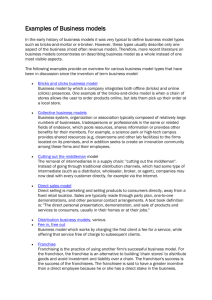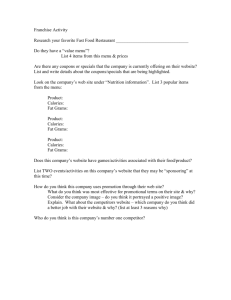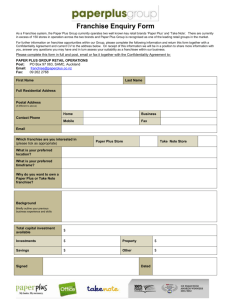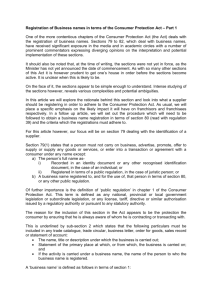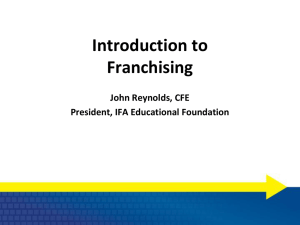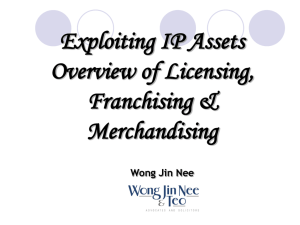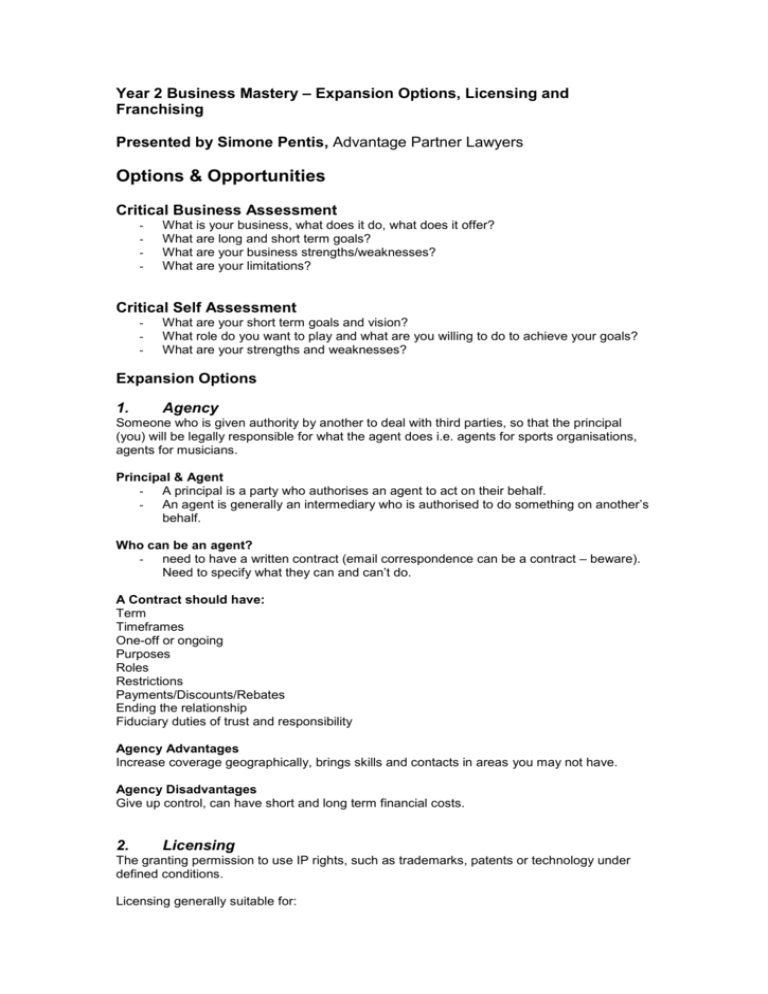
Year 2 Business Mastery – Expansion Options, Licensing and
Franchising
Presented by Simone Pentis, Advantage Partner Lawyers
Options & Opportunities
Critical Business Assessment
-
What is your business, what does it do, what does it offer?
What are long and short term goals?
What are your business strengths/weaknesses?
What are your limitations?
Critical Self Assessment
-
What are your short term goals and vision?
What role do you want to play and what are you willing to do to achieve your goals?
What are your strengths and weaknesses?
Expansion Options
1.
Agency
Someone who is given authority by another to deal with third parties, so that the principal
(you) will be legally responsible for what the agent does i.e. agents for sports organisations,
agents for musicians.
Principal & Agent
- A principal is a party who authorises an agent to act on their behalf.
- An agent is generally an intermediary who is authorised to do something on another’s
behalf.
Who can be an agent?
- need to have a written contract (email correspondence can be a contract – beware).
Need to specify what they can and can’t do.
A Contract should have:
Term
Timeframes
One-off or ongoing
Purposes
Roles
Restrictions
Payments/Discounts/Rebates
Ending the relationship
Fiduciary duties of trust and responsibility
Agency Advantages
Increase coverage geographically, brings skills and contacts in areas you may not have.
Agency Disadvantages
Give up control, can have short and long term financial costs.
2.
Licensing
The granting permission to use IP rights, such as trademarks, patents or technology under
defined conditions.
Licensing generally suitable for:
-
copyright, patents, trademarks, designs
inventors and innovators
manufacturing technologies
Can specify usage rights, exclusive or non exclusive, once off i.e. a photographer may license
a magazine publisher to use one of his photographs, but may limit the use to one issue.
Licensing Advantages
- Using other peoples resources, strengths, money – quick expansion, overseas
marks.
Licensing Disadvantages
Losing control over marketing, distribution. Costs – Trade Marks, Patents internationally.
Considerations
- who owns the IP?
- do you know your IP?
- do you have an IP register listing what you own?
- is your IP appropriately protected? – legal, advice, patent attorney – copyright,
patents, trademarks, designs.
- different countries different laws and costs
- should be valued in your accounts
- defined and protect.
Logo – if a graphic designer designs it, it has to be assigned to you otherwise they own it.
i.e. can have assignment deed,
IP – have a copyright – i.e. these are my designs until you pay me, then it’s yours. Need to
make sure you won the structure i.e. with documents, taking the sensitivity out of it. Copyright
doesn’t protect the idea.
You can assign the IP to another entity (rather than you). So the IP entity has a licensing
agreement with the trading entity. So if being sued it would be the trading entity.
Types of IP
Marketing material, manuals, books, trademarks, logos,
Register: date, who created, who owns it, is it registered, when does it expire. It’s your value
– helps with capital, franchising etc.
www.ipaustralia.gov.au
Ideas are protected by patents, not copyright.
Patent: protection for an idea for a period of time.
Copyright: is the expression, how it looks. Copyright is automatic is Australia (can’t register) –
put it on everything. With All Rights Reserved. (Need to do this on manuals)
Ask yourself: Do I need a design right? Do I need a patent?
Check your business name – a registration means nothing. The only thing will be a
Trademark. If you don’t use what you registered, you will lose it.
Trademark Protection
-
3.
Is it a word? Covers so much more
Is it a logo? If you add to the logo, then need to trademark again.
Franchising
-
over 900 systems operating in Australia, in over 70k workplaces
employees over 600k people
Franchising is a method of distributing products or services. The granting of the right by a
Franchisor to a Franchisee to operate a business using a trademark and a system.
If your agreement meets the requirements of a franchise agreement, then you are a franchise.
(even if you think you are a licensee).
Types of Franchises
- Product & Trade Name Franchises
-
Business Format Franchise
(the most common form)
- established brand, trademark or brand names
- detailed system and methods of operation
- established and proven system/method
- reduced risk of business failure
- site selection
- training, launch assistance and ongoing support
- group purchasing benefits
- reduced costs of national or regional advertising
- ongoing research and NPD
Restriction for franchisees
- The franchisor has ultimate control and must abide by the Franchisor’s rules
- Need to be a team player
- Restrictions in respect to how you operate, sell products and services, buy products
and/or services and end or transfer the agreement
- Initial fee and ongoing commitment to pay royalties, service fess or suppliers
- Lack of control over Franchisor’s corporate direction
- Relationships with franchisor and their staff
The main thing is the systems. They will go with a less known brand, the one with the
systems.
Must read the Franchise Code of Conduct – go to the Franchise Council of Australia.
If you breach the Franchise Code of Conduct, you breach the Trade Practices Act.
The agreement needs restrictions of trade and when the agreement ends.
Are you ready to Franchise?
- Do you know why you want to franchise?
- Have you any experience?
- Do you fully understand the franchise model?
- Do you have exclusive systems, processes or products?
- Is it easily replicable?
- Is your IP secure?
- Do you have a pilot of the business with a proven success?
- Do you have a proposed business model?
- Have you done a feasibility study?
- Do you have the money to finance it?
- Are you good at relationships
- Are you willing to learn to be a franchisor and to invest in that learning?
With premises you need to consider: does the franchisor hold the head lease? (that can be an
issue). However it can be an advantage if it’s a great site with a bad franchisee, if there is a
large fit out cost.
Franchisors are now thinking twice about head leases i.e. if it’s in the city might want the site,
but not regionally.
Steps to set up a franchise
- need to financially modelling (analyse expenses)
- get a copy of the Franchise Code of Conduct (look at the annexes)
- Pilot
- Feasibility Study
- Business Plan
- Operations manual
You cannot sell a franchise without giving the disclosure document over prior to 14 days
before money is changed hands.
Need to talk to accountant to get the best tax structure i.e. IP Entity and Trading Entity
A franchisor has an obligation to develop the business – franchisees will be looking for this.
Franchising Legal Costs can range from: $8 to $24k
Different Franchisors
MailPlus business services
Fastways couriers
Frontline Recruitment
Guttervac
Hire a Hubby
Business Coaching – Action Coach
Bakers Club
Bank of Qld
Mortgage Brokers
Fitness Centres
First Class Accountants
Information Sites
Licensing - www.lesi.org
Franchising - www.franchise.org.au
Agency - www.fairtrading.qld.gov.au


